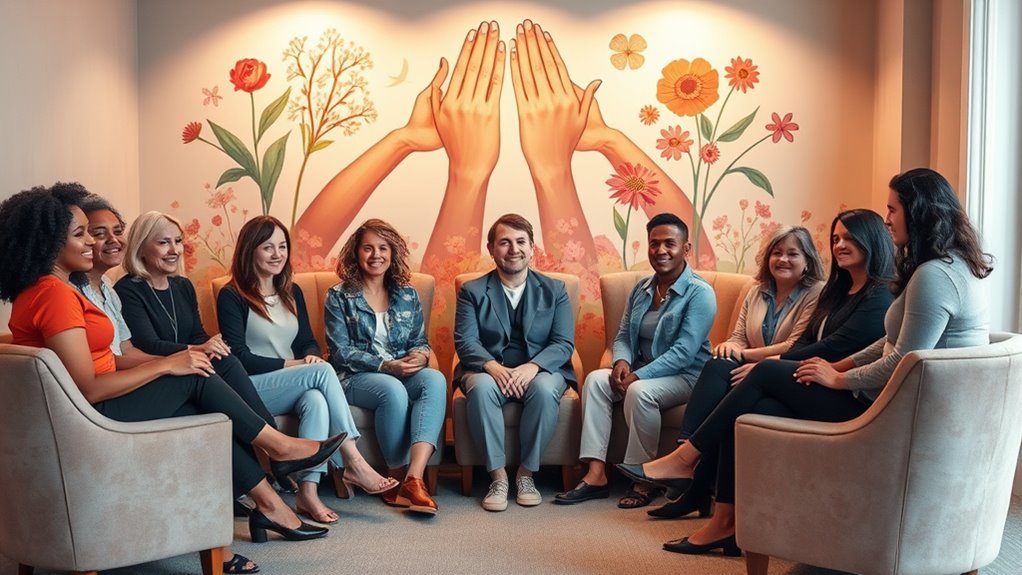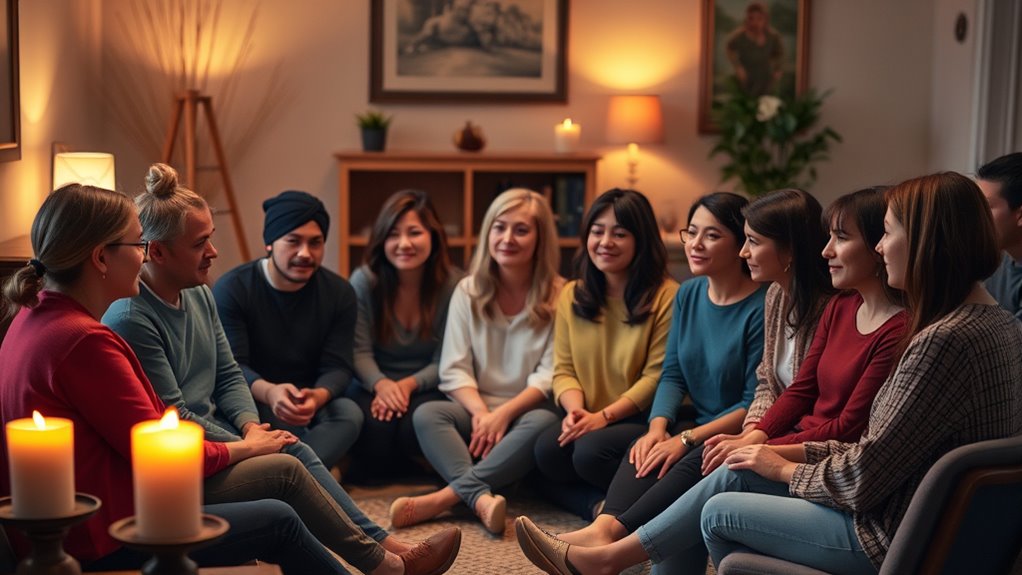Support groups create a safe space where you can share your experiences, validate your feelings, and find emotional safety. They offer community support, education about narcissistic abuse, and tools to build resilience and set healthy boundaries. As you participate, you’ll gain ongoing encouragement, learn to recognize early warning signs, and strengthen your confidence. If you want to discover how consistent support can guide you long-term, there’s more to explore that can help your healing journey.
Key Takeaways
- Support groups provide a safe, confidential environment for sharing experiences and emotional validation.
- They foster a sense of community, reducing isolation and reinforcing that survivors are not alone.
- Group discussions offer practical coping strategies and insights from others who understand narcissistic abuse.
- Regular participation builds emotional resilience and encourages ongoing personal growth.
- Connecting with others helps survivors regain confidence, set boundaries, and sustain long-term recovery.
Building a Safe Space for Healing

Creating a safe space for healing begins with structured, therapist-led environments that prioritize emotional safety and clear boundaries. Professional facilitators, experienced in narcissistic abuse recovery, deliver focused sessions using evidence-based methods like CBT. These sessions maintain productivity through clear agendas and boundaries, ensuring discussions stay on track. Access to specialists offers practical strategies for emotional regulation, helping you manage intense feelings. Mediated discussions emphasize facts and proven approaches, avoiding unproductive venting. Participation is carefully curated through vetting processes, ensuring everyone shares similar recovery goals. Strict guidelines against harassment foster respectful interactions, while anonymous options help those hesitant to share openly. Additionally, understanding the importance of contrast ratio in visual clarity can be metaphorically applied to creating environments with balanced emotional “black and white”—clarity and safety—further supporting your healing journey. This foundation enables you to heal confidently, knowing you’re in a supportive, structured environment designed for safe and effective recovery, which is essential for effective healing. Recognizing the significance of emotional safety ensures that your environment supports vulnerability and trust necessary for true recovery. Incorporating practices that enhance skin health can also metaphorically mirror how nurturing environments foster healing, emphasizing the importance of consistent, gentle care in your recovery process. When establishing these safe spaces, it’s also important to consider cookie consent management to ensure privacy preferences are respected and boundaries are maintained.
Sharing and Validating Personal Stories

Sharing and validating personal stories play a vital role in healing from narcissistic abuse by fostering connection and understanding. When you share your experience, you realize you’re not alone, and others affirm your feelings. Support groups use various methods to facilitate this process:
- Structured journaling workshops help organize overwhelming emotions and clarify your trauma.
- Expert-led audio groups create safe spaces for sharing without visual exposure, easing anxiety.
- Therapist-recommended groups ensure support tailored to your needs.
- Writing journals serve as cathartic tools for expressing fragmented memories.
- Trauma-informed approaches prioritize emotional safety, preventing retraumatization.
- Recognizing signs of abuse and sharing your story can help you process your experiences and rebuild trust in others.
- Incorporating evidence-based practices in group settings enhances the effectiveness of healing strategies.
- Engaging in emotional safety measures ensures that participants feel secure and supported throughout their healing journey.
- Understanding the importance of supportive environments can significantly influence the healing process and recovery outcomes.
Learning Together: Education and Awareness

Learning together through education and awareness is essential for empowering survivors and dismantling misconceptions about narcissistic abuse. When you gain knowledge, you can better recognize patterns and protect yourself. Educational efforts include psychology courses on personality disorders like NPD and health programs that focus on emotional well-being. Expert-led workshops and survivor-derived materials deepen understanding. Additionally, campaigns challenge societal myths surrounding narcissism, fostering awareness. Aura can also serve as a visual tool for understanding emotional and spiritual states, enhancing personal insight. Recognizing warning signs such as emotional distance or secretive behaviors can be crucial in early intervention Relationships – Personality Test. Incorporating insights from Boost Your Baby can provide additional strategies for nurturing resilience and recovery during this journey. Glycolic acid benefits from skincare studies can also inform personal wellness routines that promote healing.
Developing Resilience and Healthy Boundaries

Building resilience and establishing healthy boundaries are essential steps in recovering from narcissistic abuse. Resilience helps you rebuild self-worth, recognize manipulation, and regain confidence in your decision-making. You can strengthen your sense of self by reconnecting with your values and practicing self-advocacy without guilt. Developing coping strategies like mindfulness, trauma-focused therapy, and leveraging community support enables you to manage emotional triggers and reduce shame. Support groups validate your experiences and offer collective problem-solving, making recovery feel less isolating. To set healthy boundaries, identify your non-negotiables, prioritize emotional safety, and learn to say no without guilt. Establish physical and emotional distance from toxic environments, empowering you to protect your well-being and foster long-term healing. Understanding that establishing boundaries is a process that requires ongoing effort and self-compassion. Incorporating knowledge about toilet maintenance and common issues can also serve as a metaphor for routine self-care and vigilance in recognizing early signs of emotional distress, helping you stay proactive in your healing journey.
Sustaining Growth Through Ongoing Support

Sustaining growth after initial recovery from narcissistic abuse requires ongoing support that adapts to your evolving needs. Online support groups, like Circles Up, offer over 500 weekly audio-based sessions, ensuring consistent, accessible help. Audio-only platforms protect your privacy and allow anonymous participation, reducing social anxiety. Asynchronous engagement lets you join sessions on your schedule, maintaining momentum without pressure. Virtual and in-person options provide flexible ways to stay connected, while global access connects survivors in regions with limited local resources. These ongoing supports foster community integration, helping you feel less isolated and more validated. Support groups have been shown to significantly improve long-term emotional well-being and resilience. By continuously engaging with support networks, you reinforce your healing journey, develop resilience, and solidify healthy patterns of recovery over time. Additionally, such support systems encourage emotional resilience, which is crucial for overcoming ongoing challenges and maintaining progress. Regular participation in these groups helps build community integration, strengthening your sense of belonging and shared understanding in the recovery process. Incorporating ongoing support into your routine ensures sustained growth and emotional stability as you navigate life beyond abuse.
Frequently Asked Questions
How Do Support Groups Address Feelings of Shame and Guilt?
Support groups help you address feelings of shame and guilt by providing shared understanding and validation. When you hear others’ stories, you realize you’re not alone, which normalizes your reactions. Mutual empathy builds trust, and hearing that your feelings are common reduces shame. Learning about abuse dynamics and reframing self-blame empowers you to see responsibility where it belongs, fostering healing and restoring your sense of worth.
What Strategies Are Used to Manage Emotional Triggers During Sessions?
To manage emotional triggers during sessions, you focus on identification, regulation, and prevention. You use trigger journals to recognize patterns, practice mindfulness and grounding exercises to stay present, and employ assertive communication to set boundaries. You also rehearse responses through role-playing, develop coping strategies for immediate relief, and create personalized plans to anticipate and navigate triggers, empowering you to stay grounded and resilient during challenging moments.
How Can I Rebuild Trust After Narcissistic Abuse?
Rebuilding trust after narcissistic abuse starts with self-reflection, where you acknowledge your feelings and set healthy boundaries. Celebrate small wins, like making confident decisions, to restore your judgment. Practice grounding techniques to stay present and challenge negative self-talk. Trust your instincts and question assumptions about others. As you learn to recognize red flags, gradually open up in safe relationships, giving yourself patience and compassion throughout the healing process.
What Role Do Facilitators Play in Survivor Recovery?
Did you know that trained facilitators greatly increase survivor engagement and safety? They play an essential role by creating structured, nonjudgmental environments where you can share openly. Facilitators guide discussions, guarantee respectful communication, and help manage emotional triggers, making sure everyone feels heard and supported. Their expertise helps you navigate healing strategies, rebuild self-trust, and foster community—key steps in your recovery journey from narcissistic abuse.
How Do Support Groups Handle Differing Survivor Experiences?
Support groups handle differing survivor experiences by creating inclusive, nonjudgmental spaces where everyone can share at their own pace. You’re encouraged to express guilt, shame, or trauma without fear of stigma. They offer tailored activities, resource libraries, and flexible formats to meet your unique needs. Facilitators and survivor mentors provide guidance, ensuring you feel supported regardless of your recovery stage or background, helping you find validation and hope.
Conclusion
Remember, you’re not alone on this journey. Support groups provide a safe space where you can share, learn, and grow together. Did you know that over 70% of survivors find their healing accelerates through community support? By connecting with others who understand your experience, you build resilience and develop healthy boundaries. Keep leaning on your support network—you’ll find strength and hope every step of the way. You’re stronger than you think, and healing is possible.










